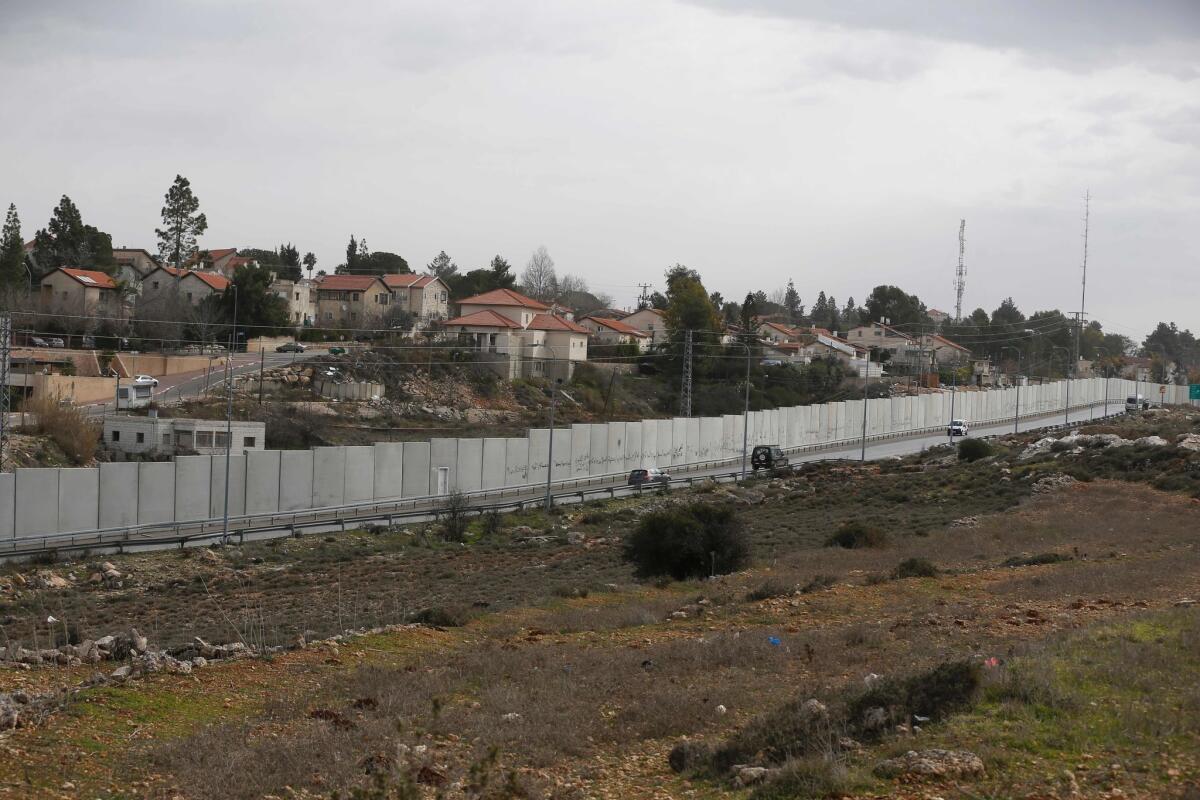White House backs away from two-state solution in Israeli-Palestinian conflict

- Share via
Reporting from Washington — On the eve of the first summit between President Trump and Israeli Prime Minister Benjamin Netanyahu, the White House late Tuesday appeared to back away from the long-standing U.S. advocacy of a so-called two-state solution for peace between Israel and the Palestinians.
“A two-state solution that doesn’t bring peace is not our goal that anybody wants to achieve,” a senior White House official said in briefing reporters ahead of the Netanyahu meeting.
U.S. policy, and that of most international groups, for decades has considered a two-state solution, where Israel and a Palestinian nation live side-by-side, as the essential basis for peace in the troubled region. But the official, who spoke to reporters under rules that did not allow him to be identified by name, cast doubt on the Trump administration’s commitment to such a policy.
Asked whether peace didn’t equal a two-state solution, the official said, “Maybe, maybe not.”
“It’s something the two sides have to agree to,” the official added. “It’s not for us to impose that vision.”
“Peace is the goal, whether it comes in the form of a two-state solution, if that’s what the parties want, or something else. If that’s what the parties want, we’re going to help them,” the official said.
The statements were the latest fluctuation in what seems to be an evolving Middle East policy for the new administration.
Initially, Trump took hard-line positions regarding Israel, refusing to condemn the expansion of settlements in West Bank land claimed by the Palestinians and vowing to move the U.S. Embassy from Tel Aviv to Jerusalem.
Relocation of the embassy is controversial because both Israelis and Palestinians claim Jerusalem, or parts of it, as their capital.
Trump also said he would turn over the Israeli-Palestinian portfolio to his son-in-law, Jared Kushner, a longtime supporter of Israel. He has nominated as his ambassador to Israel one of his lawyers, David Friedman, a passionate financial backer of settlements, which much of the world considers illegal and an impediment to peace.
More recently, however, the administration dropped talk of moving the embassy, at least in the short term, and issued a statement that was critical, albeit mildly, of settlements.
Trump has said he wants to make peace in the long conflict the “ultimate deal.” Administrations over the years have been stymied in similar goals.
Peace talks have been at an impasse for three years, and there have been continuing calls from Israeli politicians to formally annex parts of the West Bank, which has been under Israeli military occupation since the 1967 Six-Day War.
This month, Israel’s parliament approved a controversial bill giving the government authority to retroactively legalize thousands of homes in West Bank settlements and dozens of unauthorized hilltop outposts that sit on privately owned Palestinian land.
Netanyahu, whose government has approved 6,000 new homes in existing settlements in the West Bank and East Jerusalem since Trump’s inauguration, has recently avoided reiterating support for a Palestinian state.
Even some Palestinians have suggested that the only way out of the deadlock might be a one-state solution. The idea would be to try to force Israel to give Arab residents full voting rights, jeopardizing the Jewish identity upon which Israel was created in 1948, or risk being under permanent sanction by the rest of the world.
“If the choice is one state, Israel can either be Jewish or democratic — it cannot be both — and it won’t ever really be at peace,” former Secretary of State John F. Kerry warned in December.
Both Trump and Netanyahu are eager to show an improved relationship following eight frosty years with the Obama presidency. But experts have also warned that Trump should be careful not to risk provoking Arab states, whom he needs in the fight against the Islamic State extremist group and as a counterweight to Iran.
The White House official said Trump and Netanyahu, in their summit Wednesday, will discuss settlements, an embassy move and Iran.
Twitter: @TracyKWilkinson
Twitter: @alexzavis
Times staff writers Wilkinson reported from Washington and Zavis from Los Angeles.
ALSO
Netanyahu may seek to reset U.S.-Israel relations in meeting with Trump
Israel’s questioning of U.S. activist raises concerns of government pressure on groups
White House says Trump knew three weeks ago that Flynn misled on contacts with Russia
More to Read
Sign up for Essential California
The most important California stories and recommendations in your inbox every morning.
You may occasionally receive promotional content from the Los Angeles Times.












